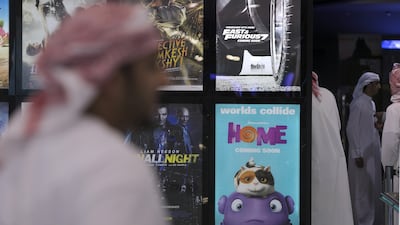Since moving back to Abu Dhabi, I have had a very odd relationship with going to the cinema. I love the whole moviegoing experience but recently I have found that I have to think twice about going to watch a film because I worry that pivotal parts of the plot would be lost due to cuts.
I still remember one of the first times I went to watch a movie after I moved back to the country. I went to see an independent film on a whim with friends. After barely an hour and a half in the theatre, we emerged with absolutely no idea what had happened. The actual runtime was supposed to be two hours. The evening left me feeling like I had wasted my time and money.
My issue is not necessarily with the censorship itself, but rather with the inconsistency of it. For example, I have watched some movies where scenes have been cut for explicit language but heard that same language in other films. I understand that there are cultural sensibilities to be mindful of and I honestly have no problem when, for example, gratuitous nudity that doesn’t add to the plot is cut. But if part of the storyline or dialogue (even minor bits) is gone, it creates a break that is quiet jarring for the viewer.
When I watched movies at the Abu Dhabi film festival, I noticed the movies were uncut. If it is acceptable for films to be screened in full during festivals, what changes when they go on to be released nationwide?
This question becomes more relevant when there seem to be different rules for public and private viewing. It is not illegal to possess uncensored films on DVD in the UAE because they are personal belongings. There is no official intervention from the national media council censorship department because it is for personal use. Only films with too many obscene scenes are banned.
For these reasons I think we should be able to have a conversation about movie censorship. While I understand the importance of and the need for an overarching regulatory board, considering that what is or isn’t appropriate is subjective and can vary from one individual to the next (which could explain some of the inconsistencies), there might be ways we can rethink our current system.
Perhaps a compromise can be found somewhere between relaxing some of the censorship and adjusting regulations? Making a new category might be able to solve this. While I am not advocating for the allowance of gratuitous nudity, films that are more explicit and would otherwise be made unwatchable if they were edited, could fall under an 18 or 21+ strict zone. In the US, movies rated “R” mean that those younger than the rating age (in this case, 17) are only allowed in with adult supervision, yet NR or NC-17 means 18+ only, with no exceptions. Adopting a similar system, in tandem with ensuring existing age restrictions are upheld in general, would help.
Most arguments that exist for censorship are related to the potential influence they may have on viewers. My siblings and I spent our youth watching action films filled with violence yet remain strongly opposed to any form of aggression as a result of our education and upbringing.
Another argument I have heard for the necessity to cut movies is that they do not depict a reality that mirrors UAE traditions.
To me this is obvious as a majority of the films that are shown are not Emirati movies, let alone ones from the region. But the reality is that most of what is considered “popular culture media” is American. This is why I think that it is necessary to support local culture and also have conversations about how we adapt to what we see.
Censorship does not cut access to whatever it is you are trying to censor. We live in an age where, like it or not, most people will find a way to access what they want. I think it could be fruitful to discuss and understand the messages we are receiving and equip youth (and society at large) with ways that they can separate what they see in films from real life rather than try to remove these message entirely.
Fatima Al Shamsi is a globetrotting Emirati foodie, film buff and football fanatic

